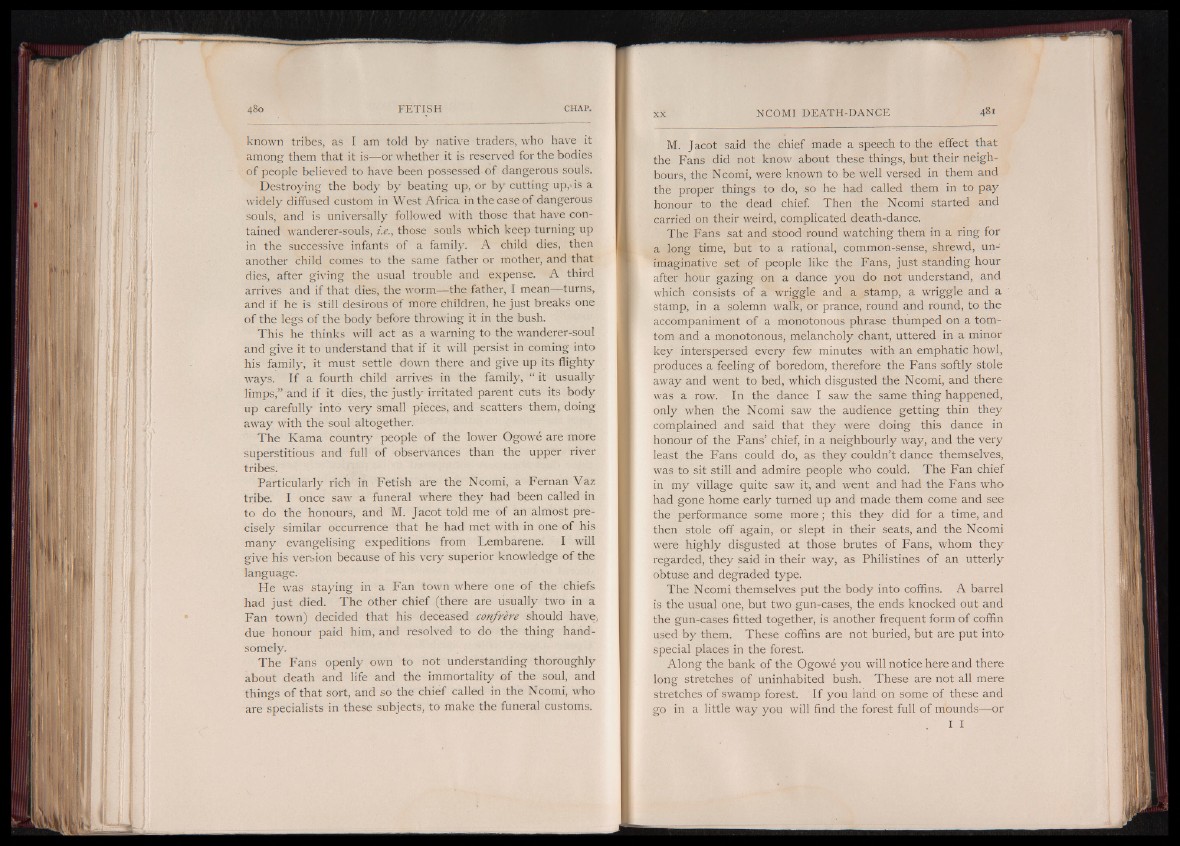
known tribes, as I am told by native traders, who have it
among them that it is— or whether it is reserved for the bodies
of people believed to have been possessed of dangerous souls.
Destroying the body by beating up, or by cutting up," is a
widely diffused custom in West Africa in the case of dangerous
souls, and is universally followed with those that have contained
wanderer-souls, i.e., those souls which keep turning up
in the successive infants of a family. A child dies, then
another child comes to the same father or mother, and that
dies, after giving the usual trouble and expense. A third
arrives and if that dies, the worm— the father, I mean— turns,
and if he is still desirous of more children, he just breaks one
of the legs of the body before throwing it in the bush.
This he thinks will act as a warning to the wanderer-soul
and give it to understand that if it will persist in coming into
his family, it must settle down there and give up its flighty
ways. I f a fourth child arrives in the family, “ it usually
limps,” and if it dies, the justly irritated parent cuts its body
up carefully into very small pieces, and scatters them, doing
away with the soul altogether.
The Kama country people of the lower Ogowe are more
superstitious and full of observances than the upper river
tribes.
Particularly rich in Fetish are the Ncomi, a Fernan Vaz
tribe. I once saw a funeral where they had been called in
to do the honours, and M. Jacot told me of an almost precisely
similar occurrence that he had met with in one of his
many evangelising expeditions from Lembarene. I will
give his version because of his very superior knowledge of the
language.
He was staying in a Fan town where one of the chiefs
had just died. The other chief (there are usually two in a
Fan town) decided that his deceased confrere should have>
due honour paid him, and resolved to do the thing handsomely.
The Fans openly own to not understanding thoroughly
about death and life and the immortality o f the soul, and
things of that sort, and so the chief called in the Ncomi, who
are specialists in these subjects, to make the funeral customs.
M. Jacot said the chief made a speech to the effect that
the Fans did not know about these things, but their neighbours,
the Ncomi, were known to be well versed in them and
the proper things to do, so he had called them in to pay
honour to the dead chief. Then the Ncomi started and
carried on their weird, complicated death-dance.
The Fans sat and stood round watching them in a ring for
a long time, but to a rational, common-sense, shrewd, unimaginative
set of people like the Fans, just standing hour
after hour gazing on a dance you do not understand, and
which consists of a wriggle and a stamp, a wriggle and a
stamp, in a solemn walk, or prance, round and round, to the
accompaniment of a monotonous phrase thumped on a tomtom
and a monotonous, melancholy chant, uttered in a minor
key interspersed every few minutes with an emphatic howl,
produces a feeling of boredom, therefore the Fans softly stole
away and went to bed, which disgusted the Ncomi, and there
was a row. In the dance I saw the same thing happened,
only when the Ncomi saw the audience getting thin they
complained and said that they were doing this dance in
honour of the Fans’ chief, in a neighbourly way, and the very
least the Fans could do, as they couldn’t dance themselves,
was to sit still and admire people who could. The Fan chief
in my village quite saw it, and went and had the Fans who
had gone home early turned up and made them come and see
the performance some more; this they did for a time, and
then stole off again, or slept in their seats, and the Ncomi
were highly disgusted at those brutes of Fans, whom they
regarded, they said in their way, as Philistines of an utterly
obtuse and degraded type.
The Ncomi themselves put the body into coffins. A barrel
is the usual one, but two gun-cases, the ends knocked out and
the gun-cases fitted together, is another frequent form of coffin
used by them. These coffins are not buried, but are put into
special places in the forest.
Along the bank of the Ogowe you will notice here and there
long stretches of uninhabited bush. These are not all mere
stretches of swamp forest. I f you land on some of these and
go in a little way you will find the forest full of mounds— or
I I